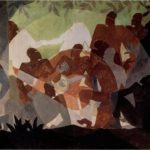
Land and Existence in Gaza
During Israel’s brutal eleven-day assault on Gaza – itself only an escalation of its daily devastation of Palestinian life – I turned to the writings of the Palestinian novelist and militant Ghassan Kanafani.

During Israel’s brutal eleven-day assault on Gaza – itself only an escalation of its daily devastation of Palestinian life – I turned to the writings of the Palestinian novelist and militant Ghassan Kanafani.

Today, when protestors shout “no justice, no peace,” we should understand this as a political principle which takes primacy over the abstract conception of a “peaceful protest.” No protest is unambiguously peaceful, for if it is oriented strategically and organizationally towards the transformation of society, it will necessarily constitute a disturbance of the peace.

“Pessimism of the intellect, optimism of the will” has become one of the classic clichés of politics. It is supposed to suggest that one should have clear-eyed recognition of how bad things are, without losing hope; it means the conscious volition for changing the world nevertheless. Nevertheless, it might be wise to be somewhat suspicious of a slogan which seems so reassuring, applicable to every context without modification.
The surprising trajectory of the Bernie Sanders campaign has revived discussions of socialist politics. And renewed interest in socialist politics has brought a renewed interest in Marxist theory, specifically about the state. This isn’t surprising, because there’s a lot to explain.

Our global situation should be understood not only in terms of a resurgent radical politics, but also in terms of depoliticization.

In the debates of the contemporary left, interventions often start with a variation on a particular theme: “Socialists think that…” Sometimes it is, “Marxists believe that…” Sometimes, “Socialists understand that…” Whatever the wording, the point is the same.

This text is a theoretical intervention, which has been prompted by questions and discussions surrounding my book. It is an interweaving of meditations on the narration of history, ideology, and the question of liberation – themes that used to belong to one fabric, but which have been torn apart in most contemporary discourses on identity.

Like Star Wars, Black Panther presents us not with science fiction but with myth, sharing with it what we might describe as “semi-feudal futurism” – a term far more appropriate for this film than “Afrofuturism,” thrown around in the mainstream media stripped of any meaningful political context. Why do white people love Black Panther, just as they love Star Wars?

In 1977 Louis Althusser gave a famous speech in Venice on “the crisis of Marxism,” a thesis almost as scandalous as that of an epistemological break in Marx’s thought.

In 1977 Louis Althusser gave a famous speech in Venice on “the crisis of Marxism,” a thesis almost as scandalous as that of an epistemological break in Marx’s thought.